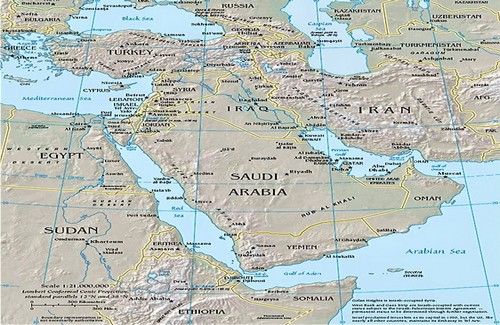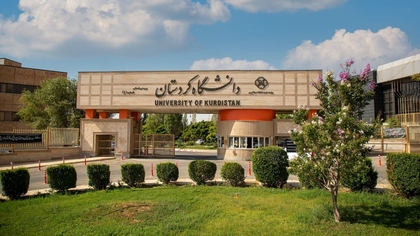Role of Saudi Arabia in Supporting West's Oil Sanctions Policy against Iran
15:42 - 7 July 2012

As the West\'s sanctions against Iran\'s oil exports enter into force, Saudi Arabia is among few countries which are able to play an important and determining role in stabilizing global oil markets.
This country, which produces about 10 million barrels per day of crude oil, is among the most important oil exporting countries as well as a major member of the Organization of Petroleum Exporting Countries (OPEC). From the viewpoint of Western countries, Saudi Arabia\'s role in enforcing any kind of oil sanction against Iran is very important as cooperation from this country can greatly alleviate possible consequences of international sanctions against Iranian crude exports. Although Saudi authorities have officially announced that the country does not intend to replace Iran\'s oil in global markets, they has also declared that Riyadh is totally ready to supply market needs after sanctions against Iran\'s oil sector enter into force. The Saudi officials have apparently signaled their consent to Iran\'s oil sanctions to the West, but the Western states are concerned that Saudi Arabia may not be able to accompany West\'s policies from the beginning to the end. On the other hand, some analysts believe that Saudi Arabia\'s positive approach to anti-Iran sanctions is the main factor which has prompted certain customers of the Iranian crude oil, including Japan and South Korea to announce that they will reduce oil imports from Iran. On the other hand, the political crisis that has overshadowed Tehran\'s ties with Riyadh subsequent to recent political developments in the Arab world has also increased the possibility that Saudi Arabia may embark on increasing its oil output in order to help the West with its effort to ban oil sales from Iran. This article tries to answer the question about quality and nature of Saudi Arabia\'s role in the West\'s oil sanctions policy against Iran. Another question which will be answered here is whether Saudi Arabia is essentially capable of replacing Iran\'s crude oil in the international market in case of sanctions or not?
By producing 10 million barrels per day of crude oil, Saudi Arabia is currently the biggest exporter of oil in the world. It is, of course, the sole country which can prevent sudden oil price hikes by rapidly increasing its production. According to some Saudi officials, the country is currently pumping 12 million barrels per day of crude oil into the market. On the opposite, the Islamic Republic of Iran is exporting only 4.2 million barrels per day and is the second in terms of oil exports among OPEC member countries. Saudi Arabia is carefully observing Iran\'s oil export to its biggest customers and has started an accurate count of Iran\'s oil export consignment. This is an urgent plan for Saudi Arabia because it will enable Riyadh to make up for the void of the Iranian oil and reduce its impact on global markets. According to available estimates, Saudi Arabia can produce 5.1 million barrels of oil per day for a long period of time. Of course, some estimates claim that Saudi Arabia can produce 12 million barrels per day of crude oil which seems somehow exaggerated.
The main factor which has given further prominence to Saudi Arabia\'s role in this policy is recent positions taken by the country as well as its willingness to accompany the West in mounting pressure on Iran. This issue has been further corroborated by analysis of new realities of the region which stem from the political developments known as the Arab Spring, especially in immediate neighborhood of Saudi Arabia. Using the oil weapon against Iran was first proposed by the former director of Saudi Arabia\'s intelligence services and a former Saudi ambassador to the United States, Turki al-Faisal. His remarks triggered more explicit statements by other Saudi officials who claimed that the kingdom is planning to increase crude production to meet the international market demands. On the other hand, the latest OPEC meeting in June, which was attended by Iranian and Saudi officials, failed to achieve its goal due to obvious differences between the two countries on increasing the organization\'s overall crude output. Following the meeting, Saudi Arabia took harsh positions on Iran. Saudi Arabia has other reasons to reduce oil prices because it is a goal which is pursued by the United States and other Western countries. Western countries, as a whole, intend to reduce oil prices in order to increase economic pressures on Iran. In addition, Saudi Arabia was hoping that by encouraging OPEC to increase its production ceiling, Tehran will lose its position as the second biggest crude producer of OPEC after Saudi Arabia. Therefore, if OPEC decided to increase production quota of its members, Saudi Arabia and its allies would be able to distribute the production hike among other members.
Two real analyses will be mentioned here in order to further expound these scenarios and shed more light on the true capacity of Saudi Arabia for cooperation with Iran oil sanctions. Although these analyses depict two viewpoints which are opposite to each other, they can help us to explain the existing realities.
According to the first analysis, when Iran threatened to lower its oil export to India for various reasons, Saudi Arabia started to increase its crude export to that country to take Iran\'s place. Therefore, it seems that Saudi Arabia can make up for a large part of the Iranian crude if Western sanctions against Iran\'s oil sector enter into force. Saudi Arabia has a record in this regard as well. When Iran lowered its oil production soon after the victory of the Islamic Revolution, Saudi Arabia increased its output to make up for the shortage of Iran\'s oil. Also, during the second Persian Gulf War, Iraq was made subject to oil sanctions after it invaded Kuwait. Saudi Arabia then moved in fast to replace its oil for that of Iraq and Kuwait which were not able to continue crude exports due to war or sanctions.
The second analysis, however, which is the opposite of the first analysis, says that Saudi officials\' allegations about being able to make up for as much as 50 percent of the Iranian oil supply to the market, are merely for propaganda purposes and do not conform to the existing realities. They argue that 50 percent of Iran\'s oil output is equal to total oil production by Libya. A review of Saudi Arabia\'s performance when Libya was going through critical conditions and its oil production had totally stopped will provide a good ground for judgment about Saudi Arabia\'s actual capacity. During the Libya crisis, the international market lost about 1.2 million barrels of crude oil per day. Therefore, if Saudi Arabia had actual surplus capacity to make up for the oil supply shortage in international markets, it should have been able to compensate for the lack of the Libyan oil in the market and prevent sudden rise of the oil price. However, despite frequent claims by Saudi officials about increasing their crude output, it did not happen in reality and global oil prices continued to soar to the level that member states of International Energy Agency had to start using their strategic petroleum reserves. Many energy experts maintain that Saudi Arabia failed during that period to control oil market conditions as expected by increasing its oil output.
The above facts prove the role of Saudi Arabia in supporting anti-Iran oil sanctions beyond any doubt. Of course, Saudi officials have alleged that the increase in their country\'s oil output is only meant to make up for the shortage of oil in the market and is by no means related to any policy for confrontation with Iran. Saudi officials have frequently announced that in case Iran\'s oil exports fall, they will supply the market with enough oil. Saudi Arabia is, thus, missioned to assure countries which import oil from Iran that when international ban on buying Iranian oil enters into force, Riyadh will supply them with enough oil. The main factor which can guarantee the success of Saudi Arabia\'s policy of supporting West\'s anti-Iranian sanctions is cooperation from such countries as India and China as well as other states which are major customers of the Iranian crude oil.
Major comments and analyses which seem to be relevant in this regard can be summarized in the following four propositions:
1. Imposing oil sanctions against Iran, even if Saudi Arabia tries to compensate for the shortage, will still mount pressure on the market and, as a result, increase price of oil in international markets;
2. The surplus production capacity of Saudi Arabia is special to heavy oil which cannot be used, at least in short term, by refineries which have been designed on the basis of the Iranian light crude;
3. Many analysts are doubtful about Saudi Arabia\'s capacity to fulfill its claims in practice, at least in the short run. They say increasing the kingdom\'s production capacity by using the existing facilities does not seem to be a real possibility. On the other hand, such analysts mention the model of Libya in order to prove their arguments in this regard;
4. Despite the United States pressures against India and South Korea in order to bring them in line with the US policies against Iran, China is still very likely to openly announce its support for the continuation of oil exports from Iran. This seems especially more true considering that China has increased its oil purchase from Iran by 30 percent during the past two months.
In conclusion, Saudi Arabia should respect the existing realities, especially OPEC\'s regulations on oil production ceiling and avoid of direct confrontation with Iran in the region. Iran has always stated that it considers sustained interaction as a main principle in its relations with the neighboring countries and also believes that security of the Persian Gulf region has to be a sustainable form of security which should be realized in cooperation with all littoral states of the Persian Gulf. Adopting such hostile policies by Saudi Arabia will not only fail to help solve problems with neighboring countries, but also provide grounds for further escalation of tension in the entire region.
By Kamran Karami, Senior Researcher at International Peace Studies Centre (IPSC)
This country, which produces about 10 million barrels per day of crude oil, is among the most important oil exporting countries as well as a major member of the Organization of Petroleum Exporting Countries (OPEC). From the viewpoint of Western countries, Saudi Arabia\'s role in enforcing any kind of oil sanction against Iran is very important as cooperation from this country can greatly alleviate possible consequences of international sanctions against Iranian crude exports. Although Saudi authorities have officially announced that the country does not intend to replace Iran\'s oil in global markets, they has also declared that Riyadh is totally ready to supply market needs after sanctions against Iran\'s oil sector enter into force. The Saudi officials have apparently signaled their consent to Iran\'s oil sanctions to the West, but the Western states are concerned that Saudi Arabia may not be able to accompany West\'s policies from the beginning to the end. On the other hand, some analysts believe that Saudi Arabia\'s positive approach to anti-Iran sanctions is the main factor which has prompted certain customers of the Iranian crude oil, including Japan and South Korea to announce that they will reduce oil imports from Iran. On the other hand, the political crisis that has overshadowed Tehran\'s ties with Riyadh subsequent to recent political developments in the Arab world has also increased the possibility that Saudi Arabia may embark on increasing its oil output in order to help the West with its effort to ban oil sales from Iran. This article tries to answer the question about quality and nature of Saudi Arabia\'s role in the West\'s oil sanctions policy against Iran. Another question which will be answered here is whether Saudi Arabia is essentially capable of replacing Iran\'s crude oil in the international market in case of sanctions or not?
By producing 10 million barrels per day of crude oil, Saudi Arabia is currently the biggest exporter of oil in the world. It is, of course, the sole country which can prevent sudden oil price hikes by rapidly increasing its production. According to some Saudi officials, the country is currently pumping 12 million barrels per day of crude oil into the market. On the opposite, the Islamic Republic of Iran is exporting only 4.2 million barrels per day and is the second in terms of oil exports among OPEC member countries. Saudi Arabia is carefully observing Iran\'s oil export to its biggest customers and has started an accurate count of Iran\'s oil export consignment. This is an urgent plan for Saudi Arabia because it will enable Riyadh to make up for the void of the Iranian oil and reduce its impact on global markets. According to available estimates, Saudi Arabia can produce 5.1 million barrels of oil per day for a long period of time. Of course, some estimates claim that Saudi Arabia can produce 12 million barrels per day of crude oil which seems somehow exaggerated.
The main factor which has given further prominence to Saudi Arabia\'s role in this policy is recent positions taken by the country as well as its willingness to accompany the West in mounting pressure on Iran. This issue has been further corroborated by analysis of new realities of the region which stem from the political developments known as the Arab Spring, especially in immediate neighborhood of Saudi Arabia. Using the oil weapon against Iran was first proposed by the former director of Saudi Arabia\'s intelligence services and a former Saudi ambassador to the United States, Turki al-Faisal. His remarks triggered more explicit statements by other Saudi officials who claimed that the kingdom is planning to increase crude production to meet the international market demands. On the other hand, the latest OPEC meeting in June, which was attended by Iranian and Saudi officials, failed to achieve its goal due to obvious differences between the two countries on increasing the organization\'s overall crude output. Following the meeting, Saudi Arabia took harsh positions on Iran. Saudi Arabia has other reasons to reduce oil prices because it is a goal which is pursued by the United States and other Western countries. Western countries, as a whole, intend to reduce oil prices in order to increase economic pressures on Iran. In addition, Saudi Arabia was hoping that by encouraging OPEC to increase its production ceiling, Tehran will lose its position as the second biggest crude producer of OPEC after Saudi Arabia. Therefore, if OPEC decided to increase production quota of its members, Saudi Arabia and its allies would be able to distribute the production hike among other members.
Two real analyses will be mentioned here in order to further expound these scenarios and shed more light on the true capacity of Saudi Arabia for cooperation with Iran oil sanctions. Although these analyses depict two viewpoints which are opposite to each other, they can help us to explain the existing realities.
According to the first analysis, when Iran threatened to lower its oil export to India for various reasons, Saudi Arabia started to increase its crude export to that country to take Iran\'s place. Therefore, it seems that Saudi Arabia can make up for a large part of the Iranian crude if Western sanctions against Iran\'s oil sector enter into force. Saudi Arabia has a record in this regard as well. When Iran lowered its oil production soon after the victory of the Islamic Revolution, Saudi Arabia increased its output to make up for the shortage of Iran\'s oil. Also, during the second Persian Gulf War, Iraq was made subject to oil sanctions after it invaded Kuwait. Saudi Arabia then moved in fast to replace its oil for that of Iraq and Kuwait which were not able to continue crude exports due to war or sanctions.
The second analysis, however, which is the opposite of the first analysis, says that Saudi officials\' allegations about being able to make up for as much as 50 percent of the Iranian oil supply to the market, are merely for propaganda purposes and do not conform to the existing realities. They argue that 50 percent of Iran\'s oil output is equal to total oil production by Libya. A review of Saudi Arabia\'s performance when Libya was going through critical conditions and its oil production had totally stopped will provide a good ground for judgment about Saudi Arabia\'s actual capacity. During the Libya crisis, the international market lost about 1.2 million barrels of crude oil per day. Therefore, if Saudi Arabia had actual surplus capacity to make up for the oil supply shortage in international markets, it should have been able to compensate for the lack of the Libyan oil in the market and prevent sudden rise of the oil price. However, despite frequent claims by Saudi officials about increasing their crude output, it did not happen in reality and global oil prices continued to soar to the level that member states of International Energy Agency had to start using their strategic petroleum reserves. Many energy experts maintain that Saudi Arabia failed during that period to control oil market conditions as expected by increasing its oil output.
The above facts prove the role of Saudi Arabia in supporting anti-Iran oil sanctions beyond any doubt. Of course, Saudi officials have alleged that the increase in their country\'s oil output is only meant to make up for the shortage of oil in the market and is by no means related to any policy for confrontation with Iran. Saudi officials have frequently announced that in case Iran\'s oil exports fall, they will supply the market with enough oil. Saudi Arabia is, thus, missioned to assure countries which import oil from Iran that when international ban on buying Iranian oil enters into force, Riyadh will supply them with enough oil. The main factor which can guarantee the success of Saudi Arabia\'s policy of supporting West\'s anti-Iranian sanctions is cooperation from such countries as India and China as well as other states which are major customers of the Iranian crude oil.
Major comments and analyses which seem to be relevant in this regard can be summarized in the following four propositions:
1. Imposing oil sanctions against Iran, even if Saudi Arabia tries to compensate for the shortage, will still mount pressure on the market and, as a result, increase price of oil in international markets;
2. The surplus production capacity of Saudi Arabia is special to heavy oil which cannot be used, at least in short term, by refineries which have been designed on the basis of the Iranian light crude;
3. Many analysts are doubtful about Saudi Arabia\'s capacity to fulfill its claims in practice, at least in the short run. They say increasing the kingdom\'s production capacity by using the existing facilities does not seem to be a real possibility. On the other hand, such analysts mention the model of Libya in order to prove their arguments in this regard;
4. Despite the United States pressures against India and South Korea in order to bring them in line with the US policies against Iran, China is still very likely to openly announce its support for the continuation of oil exports from Iran. This seems especially more true considering that China has increased its oil purchase from Iran by 30 percent during the past two months.
In conclusion, Saudi Arabia should respect the existing realities, especially OPEC\'s regulations on oil production ceiling and avoid of direct confrontation with Iran in the region. Iran has always stated that it considers sustained interaction as a main principle in its relations with the neighboring countries and also believes that security of the Persian Gulf region has to be a sustainable form of security which should be realized in cooperation with all littoral states of the Persian Gulf. Adopting such hostile policies by Saudi Arabia will not only fail to help solve problems with neighboring countries, but also provide grounds for further escalation of tension in the entire region.
By Kamran Karami, Senior Researcher at International Peace Studies Centre (IPSC)



